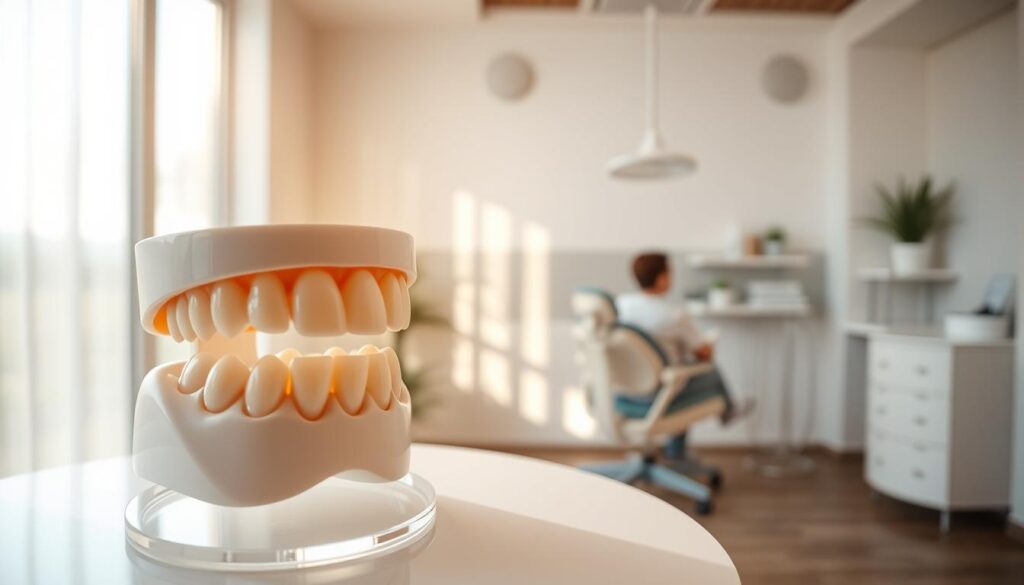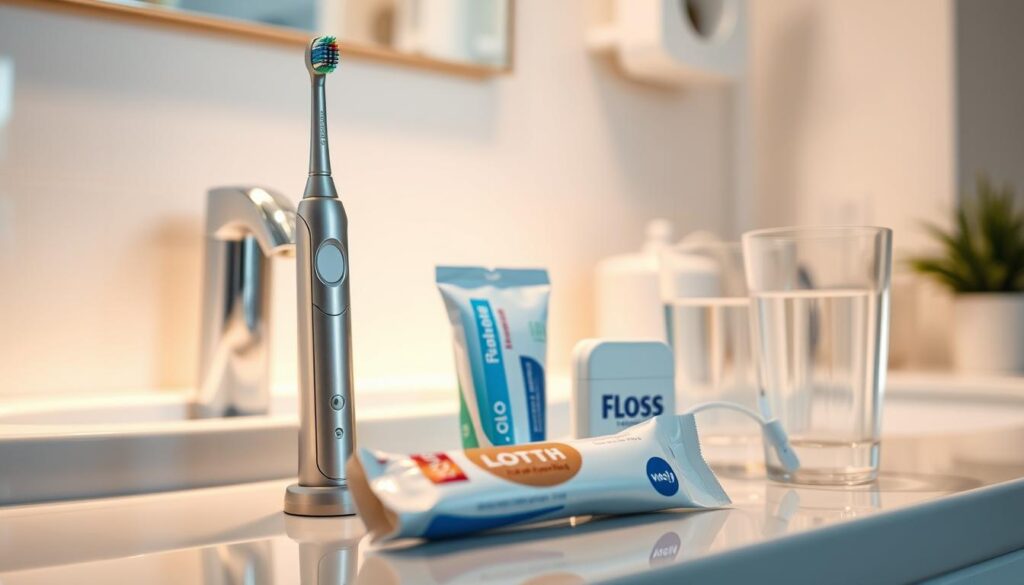What if I Haven’t Been to the Dentist in Years?

Around 42% of Americans don’t visit the dentist as they should, says the Centers for Disease Control and Prevention. Not going to the dentist might seem OK if you’re not in pain. But, it can badly affect your oral health. Our mouths have a complex system that needs care before we feel any pain. Dental plaque builds up on our teeth and turns into tartar. If we don’t go for regular dental checkups, only a dentist can remove this tough tartar.
Think about cavities. They start small but can quickly become a big deal, needing a root canal or tooth pulling. Gingivitis can move to periodontitis, harming our teeth’s foundation. Ignoring dental care can lead to big health problems. If we skip the dentist, costs go up and fixing problems gets harder. The question “Do I still need to see a dentist if it doesn’t hurt?” is a clear yes.
Key Takeaways
- The importance of preventive dentistry and the risks of extended periods without a dentist visit.
- Dental issues accumulate subtly and can lead to serious complications in both oral health and overall well-being.
- Early detection through regular dental checkups can circumvent more invasive and costly treatments later.
- The not-so-obvious signs that indicate a dentist visit is necessary, despite a lack of pain.
- Responding to the question of whether a visit is necessary when not in pain, and how dental neglect compounds over time.
Understanding Dental Health and Its Importance
It’s very important to keep up with dental hygiene. A great smile and your health depend on it. Keeping up with your oral care routine and seeing your dentist regularly helps prevent dental health consequences.

Many people don’t realize how important regular dental check-ups are. At these visits, dentists check your teeth, gums, and mouth. They also clean away plaque and tartar. This keeps your dental hygiene up and prevents problems that could be expensive to fix later.
The Role of Regular Dental Check-ups
Dentists have special tools to find early tooth decay or disease. Finding problems early at these visits can help fix them before they get worse. This helps you avoid serious dental health consequences later. Check out this link for more info on oral care routine.
Consequences of Neglecting Oral Care
Ignoring your oral health can cause many issues. Without regular check-ups, tooth decay and gum disease can get worse. This can lead to pain, lost teeth, and other health problems. The worst part is, these conditions can get worse without you noticing, hurting your life quality.
Knowing how oral health affects your overall health is key. By making regular dental visits a priority, you can keep your mouth healthy. This can help avoid diseases that could impact your whole body.
Common Dental Issues from Skipping Appointments
Not going to the dentist regularly can lead to big mouth problems. Cavities, tooth decay, and swollen gums are common. If not treated soon, they can badly harm your mouth health. Also, missing dental checks ups the risk of oral cancer. This is a very serious disease that can be deadly without early detection.
Cavities and Tooth Decay: Cavities are permanent damages on your teeth’s hard surface. They turn into tiny holes. This happens mostly because of mouth bacteria, too much snacking, drinking sugary stuff, and not cleaning your teeth well.
Gum Disease: Gum disease first shows as gum swelling. It’s caused by bacteria in your mouth. Without the right treatment, it can lead to losing your teeth. This is due to the damage to the tissue that holds your teeth. Advanced symptoms include swelling, bleeding, soreness, and gums that pull back.
Oral Cancer Risks: Oral cancer can show up as sores, rough spots, or bumps in your mouth. It can hit any area, like lips, gum, cheek lining, tongue, and both hard or soft palate. Going to the dentist often helps find and manage these early signs of cancer.
| Condition | Symptoms | Risk Factors |
|---|---|---|
| Tooth Decay | Visible pits or holes, sensitivity to sweet, hot, or cold drinks | Poor oral hygiene, high sugar diet, lack of fluoride |
| Gum Disease | Gum swelling, bleeding, bad breath, loose teeth | Smoking, diabetes, poor oral care, genetic predisposition |
| Oral Cancer | Sores, rough spots, difficulty chewing or swallowing | Tobacco use, excessive alcohol consumption, HPV infection |
Physical Signs You May Need to See a Dentist
Knowing when to see a dentist is crucial. Look out for signs such as tooth pain, lasting bad breath, or visible damage to your teeth. These issues can indicate bigger health concerns that a professional needs to deal with.
Unexplained Pain or Sensitivity could be a hint you have cavities or gum disease starting. If hot or cold foods make your teeth hurt, you might be experiencing enamel wear or your dentin could be showing.
Bad Breath Beyond Normal, or halitosis, isn’t just a reason to feel self-conscious. It can mean you have an infection or other health problems if usual brushing and mouthwash don’t help.
Visible Damage to Teeth such as cracks, chips, or decay are serious. They don’t just look bad, they can lead to worse tooth problems and infections.
| Symptom | Possible Cause | Recommended Action |
|---|---|---|
| Dental Pain | Decay or gum infection | Immediate dental consult |
| Halitosis | Plaque buildup or gum disease | Professional cleaning and assessment |
| Visible Tooth Damage | Physical impact or poor dental health management | Visit dentist for repair and preventive care |
Psychological Effects of Avoiding the Dentist
Many people skip the dentist because they’re scared. This fear, called dental anxiety, makes them avoid appointments. Avoiding the dentist can turn into a big fear, making it hard for people to get the dental care they need.
Avoiding the dentist might seem like a good idea at first to dodge fear. However, it can make things worse for your teeth and your mind in the long run. Missing regular check-ups can harm your oral health and make your fear of the dentist even stronger. This creates a tough cycle to break. To know why it’s important to see your dentist regularly, read more.
The table below shows how avoiding the dentist because of fear can hurt you now and later. It looks at the effects of both dental anxiety and avoiding the dentist.
| Aspect | Immediate Impact | Long-Term Consequences |
|---|---|---|
| Dental Anxiety | Increased stress and discomfort during dental visits | Higher risk of severe dental problems due to postponed treatment |
| Dental Avoidance | Temporary relief from anxiety | Compounded dental issues, increased treatment complexity and cost |
| Psychological Effects | Short-term emotional relief | Long-term anxiety related to dental health worsening |
To break the cycle of dental avoidance, we must deal with the psychological side. Teaching patients about dental anxiety and offering kind, supportive care can make a big difference. To be well-prepared for your next dental visit, click here.
How to Prepare for Your First Dentist Visit in Years
When you go back to the dentist after a long time, you need to get ready to make the most of it. Think of it as a new beginning in taking care of your teeth. Here are steps to help you get ready for a check-up, including getting your dental history together.

Gathering Dental History: Before you go, pull together any old dental records you have. These records show your dental past and help your dentist know what to look for. Try to get these records from your old dentists if you can. Knowing your dental history helps your dentist give you the best care without repeating tests or treatments you’ve already had.
What to Expect During Your Examination: Your visit will include a full check-up. The team will look at your teeth, gums, and mouth carefully. They might use new tools like digital X-rays or cameras to see inside your mouth better. This check-up helps find any problems, make a plan to fix them, and talk about how to keep your teeth healthy in the future.
Getting ready for a dental check-up after a while means working with your dentist and being open about your dental past and any current problems. The dental team will be kind and helpful, aiming to improve your dental health. Being prepared and sharing your dental history makes the visit more useful and helps keep your teeth healthy.
Cost Concerns of Dental Visits
Getting back to dental care can cause worry about money for many. Knowing about dental treatment costs and dental insurance options is key. This knowledge helps manage the worry effectively. We will look at how returning to dental health care affects your wallet. We’ll also see how insurance can cut down what you pay yourself.

Dental treatments can be simple or complex and each has its own cost. Whether it’s a basic cleaning or a complex surgery, each has a price tag. For those visiting the dentist after a long time, here’s what you might pay for:
- Initial consultation and examination
- Professional cleaning
- Cavity filling
- Root canal therapy
- Gum disease treatment
- Advanced surgical procedures
Knowing these costs helps you make smart money choices. It also helps you plan for what’s coming.
Insurance Options for Returning Patients
Dental insurance is a smart way to handle dental visit expenses. Many plans are great for those getting back into dental care. Some plans might pay a big part of basic stuff like exams, x-rays, and cleanings. They can also help pay for bigger treatments like fillings and gum care.
| Insurance Type | Coverage |
|---|---|
| PPO Plans | Wide network of dentists, covers a percentage of procedures. |
| HMO Plans | Lower premiums, must choose from in-network dentists. |
| Indemnity Plans | Freedom to choose any dentist, typically higher out-of-pocket costs. |
In the end, knowing and using dental insurance can really help with the costs. This is especially true for those going back to the dentist after not going for a while.
Preventive Measures to Maintain Oral Health
To keep our mouths healthy, combining everyday hygiene with smart eating is key. Practice good dental care and eat right to protect your teeth. Let’s look at the best habits and foods for your dental health.

Daily Oral Hygiene Practices
- Brush twice daily with fluoride toothpaste to fight plaque and cavities.
- Floss every day to clean between teeth and along the gum line.
- Use antibacterial mouthwash to combat plaque bacteria and keep gums healthy.
Importance of Diet in Oral Care
- Steer clear of too much sugar and acid to prevent tooth damage and cavities.
- Eat lots of fiber-rich foods to boost saliva, which protects against cavities and gum disease.
- Make sure to get enough vitamins and minerals, like calcium and vitamin D, for strong teeth.
| Hygiene Practice | Dietary Habit | Benefit to Oral Health |
|---|---|---|
| Brushing twice daily | Low sugar intake | Reduces risk of cavities |
| Using fluoride toothpaste | Adequate calcium | Strengthens tooth enamel |
| Daily flossing | High-fiber foods | Enhances natural saliva protection |
Adding these dental care steps to our everyday lives really boosts our oral and overall health. By following these tips, we make our teeth strong and healthy ahead of time.
The Connection Between Oral and Overall Health
The link between oral health and overall health is super important. New findings keep showing how closely they are connected. It’s key to see how dental health and other medical conditions relate, especially when it comes to gum disease and heart health and diabetes dental care.
Gum disease does not only affect your oral cavity but also serves as a potential risk indicator for cardiovascular diseases.
Studies have shown a strong tie between gum problems and heart disease. This link underlines the need for health care that looks at both oral and heart health together. Oral health issues also have a big effect on people with diabetes, affecting blood sugar control and how severe diabetes symptoms are. So, it’s crucial to treat these issues in a holistic way.
Link Between Gum Disease and Heart Health
Gum disease can cause inflammation that may make heart conditions worse. Keeping your gums healthy can improve heart disease outcomes. This shows why the gum disease link is so important for overall health.
Diabetes and Oral Health
The connection between diabetes and dental health goes both ways. Poor oral health can make diabetes harder to manage. On the flip side, controlling diabetes can reduce gum disease risks. This makes diabetes dental care crucial for overall health.
Knowing how these areas impact each other shows why regular dental visits and treatments are essential. Getting oral health issues fixed quickly helps dental health and helps prevent more serious conditions linked to poor oral health.
| Condition | Impact on Oral Health | Impact on Overall Health |
|---|---|---|
| Gum Disease | Inflammation, Tooth loss | Potential increase in heart disease risk |
| Diabetes | Increased risk of periodontal disease | Impaired glucose control |
Merging dental health with overall healthcare strategies offers a more complete way to manage health. It points out how connected our body systems are and the big part oral health plays in this.
What to Discuss with Your Dentist
Talking to your dentist is key. It’s about sharing oral health changes and treatment plans. This chat helps make your dental care suit your needs perfectly.

Tell your dentist about any oral health changes. Share if you’ve felt any new pain or sensitivity. Also, mention any changes in how your teeth look or work. This info can help catch problems early.
- New sensitivity or pain in teeth or gums.
- Changes in how your teeth fit together when you bite.
- Signs of decay like discoloration.
Talking about treatment options is also key. Knowing your choices helps you decide on the best care for your smile.
- To prevent problems: Think fluoride or sealants.
- For fixing issues: This could mean fillings, crowns, or implants.
- To make your smile brighter: Consider whitening or braces.
This conversation makes sure your dental plans fit your overall health goals. It’s about getting care that looks after your well-being now and in the future.
Finding the Right Dentist After a Long Absence
After not seeing a dentist for a while, it’s key to carefully search for a dentist. You need one who’s not just good at general dentistry, but also special skills if needed. It helps a lot to look at dental office reviews and do some research.
If you have special dental issues, like TMJ disorders or need for periodontal care, find a dentist skilled in these areas. Starting to fix your dental health should be with a choice you know is good. Make sure you look into each dentist well.
- Begin your dentist search by finding clinics that give specialty dental care.
- Check out the clinic’s website to see what they offer.
- Look at dental office reviews to learn from other patients’ experiences. This shows how good the dentist and their services are.
Choosing the right dentist means more than their skills. It’s about a place where the staff treats you well, the setting is comfy, and you feel they understand you. Taking time to pick the right dentist means you’ll likely be happier and have better dental health.
Alternative Treatments for Dental Issues
Looking into alternative dental treatments is quite common these days. People want relief from minor dental issues without always going directly to a dentist. These methods, including different home dental care strategies, are good first steps or can add to regular dental treatments.
Many find quick, simple home solutions appealing. For example, saltwater rinses fight germs and reduce gum swelling, helping with small infections. Yet, it’s key to know that these are just temporary fixes, not replacements for seeing a professional dentist. Here are a few home remedies for gentle dental discomfort.
| Home Remedy | Benefits | Limitations |
|---|---|---|
| Saltwater Rinse | Reduces bacteria, soothes inflammation | Temporarily relief, not a cure |
| Clove Oil | Natural analgesic, reduces pain | May irritate if used excessively |
| Hydrogen Peroxide | Disinfectant, promotes healing | Should not be swallowed; use diluted |
Home dental care has its place but isn’t always enough. If dental problems don’t go away or get worse, it’s time to see a dentist. Moving to professional dental care is crucial for handling dental health properly. It stops small issues from becoming big problems.
Getting help from a dentist is a must when you face big pain, swelling, or signs of an infection. These may point to serious issues that only a dental expert can fix properly.
Imagine this case:
Suppose your toothache doesn’t stop even after trying clove oil or saltwater. It might mean you have an abscess or serious decay. A dentist can take care of this effectively, keeping your mouth and overall health in check.
Community Resources for Dental Care
Community-led efforts are making affordable dental care more accessible. They include non-profit clinics and university dental programs, helping lower the cost of care.
Non-profit clinics stand out in providing community dental resources. They offer many dental services for free or at a low price. Not just basic care, they also handle emergencies and long-term oral health.
University dental programs also play a big role in offering affordable dental care. Dental students provide care under expert watch. This helps cut down costs but keeps quality high.
- Screening and preventive services
- Restorative dental treatments
- Advanced dental procedures
These places are great for learning too. Patients can learn about keeping their mouth healthy and the importance of seeing a dentist regularly. This supports the bigger goal of improving public health.
| Service | Offered By | Cost |
|---|---|---|
| General Check-ups | Non-profit Clinics | Minimal to None |
| Specialized Treatments | University Dental Programs | Reduced Fee |
| Preventive Care | Both Non-profit & University Programs | Free to Low Cost |
Looking for community dental resources? Reach out to local non-profit clinics or dental schools. Ask them what services they offer and who qualifies.
Moving Forward: Maintaining Regular Dental Visits
Starting to take care of your teeth again after a long time can be tough. It means you must visit the dentist regularly. If you’re getting back into taking care of your teeth, setting up a schedule is key. This helps make sure your teeth stay healthy. We help plan regular visits to the dentist. This keeps your oral health in top shape.
Creating a Dental Care Schedule
Good dental care starts with a solid plan. Having a schedule reminds you to see the dentist often. By doing this, you catch problems early. This saves you from bigger troubles later. And it keeps your teeth clean and healthy.
The Importance of Regular Cleanings
Getting your teeth cleaned regularly is crucial to stop dental problems. Cleanings get to spots you might miss at home. They prevent plaque, tartar, and gum diseases. At these cleanings, your dentist gives tips to improve your home care. This keeps your teeth strong and healthy for a long time.


